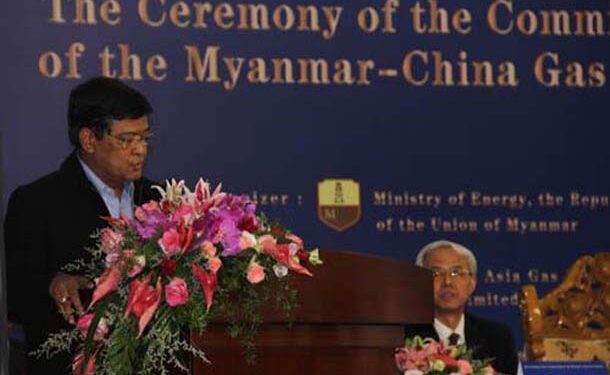MANDALAY — Despite long-held objections to the project by activists and locals, the Shwe pipeline connecting Burma’s Arakan State to Kunming in southern China began piping natural gas across the Sino-Burmese border on Sunday.
At a commissioning ceremony held at the headquarters of the Southeast Asia Gas Pipeline Company Limited (SEAGP) consortium in Mandalay, Vice President Nyan Tun praised the completion of the controversial pipeline while assuring a “good, collaborative” relationship with the Burmese government and affected communities in future.
“Shwe gas is fueling neighboring China’s hunger for energy so that we can say today, our performance is a major achievement for the mutual benefit of both countries,” Nyan Tun said at the ceremony.
According to the SEAGP executive, natural gas from the Kyaukphyu oil and gas terminal in Arakan State has been supplied to the pipeline since July 15, but Sunday marked the first time that fuel flowed into China, at the border town of Nam Khan in Shan State. Along with the South East Asia Crude Oil Pipeline Co, Ltd (SEACOP) consortium, SEAGP is responsible for the pipeline project as a joint venture between China National Petroleum Corporation (CNPC) and the former junta-linked Myanmar Oil & Gas Enterprise (MOGE).
Nyan Tun also expressed confidence that the US$14.2 million gas pipeline would improve Burma’s economy by boosting energy supplies and fueling industrialization.
“While placing a special focus on production and the delivery of natural gas, I really appreciate [efforts] to take care of our citizens and preserve our natural environment at all their work sites and along the pipeline corridor,” he said.
“I would like to assure you that the Ministry of Energy will maintain a good, collaborative relationship with the SEAGP consortium and will continue our support in future to SEAGP as well as the Shwe consortium in their future operations in Myanmar,” he added.
The 793-km long gas pipelines runs from Kyaukpyu Township on the coast of Arakan State and passes through Magwe Division, Mandalay Division and Shan State, terminating in Kunming, southern China, where it will provide the region with an important link to Burma’s offshore Shwe gas field. A second pipe for oil runs alongside the natural gas conduit, though it is still under construction.
Construction on the pipeline began in October 2010, with Daewoo International, ONGC Videsh Ltd., GAIL, KOGAS and five other contractors from India, China and South Korea involved in the project.
The pipeline has been widely criticized by opponents who claim widespread human rights abuses were perpetrated in the course of its construction. Critics also say the project has lacked transparency and is detrimental to the environment.
Environmentalists and activists have urged pipeline authorities to increase transparency and address local complaints that many whose lands were confiscated or otherwise affected by the project have not received adequate compensation from the companies involved in the undertaking.
“There are many farmers along the pipeline who have not received compensation yet. Some compensation has been withheld by the township or district officials but the farmers do not know how to—or dare not—complain about this,” said Ko Gyi from Pyin Oo Lwin, whose land was confiscated due to the pipeline.
“We are worried for our safety because when they tested the pipeline by transmitting water earlier this year in Shan State, the pipeline was damaged. What will happen when gas and oil are transmitted?” Ko Gyi added.
The Myanmar-China Pipeline Watch Committee has launched a signature campaign to urge pipeline authorities to act transparently and review concerns about the project’s safety and whether an equitable benefits-sharing arrangement is in place.
“We just want transparency for the project,” said Hnin Yu Shwe from the Myanmar-China Pipeline Watch Committee. “As far as we studied, the project has no transparency and will provide no benefits to locals who live along the pipeline, nor to citizens of the country who have had to suffer the consequences of the project, such as deforestation and environmental degradation. If the project is not transparent and doesn’t provide benefits to the country, just stop it.”
The committee issued a report earlier this year detailing environmental degradation wrought by the project, emphasizing deforestation along the pipeline corridor in Arakan State as well as central Burma’s Mahn, Minbu and Yaynanchaung forestry areas, and Shan State’s Naungcho, Goke Hteik and Moe Tae forestry areas.
The vice president of CNPC, Wang Dongjin, also insisted on Sunday that the gas pipeline will benefit both countries’ energy sectors.
“The successful commissioning of the gas pipeline will not only put gas fields into development and reward Myanmar with export revenue; more importantly, it will provide access to clean energy to the Myanmar people along this pipeline. Meanwhile, natural gas will play a major role in optimizing the energy mix in Southwest China,” Wang Dongjin said.
A separate commissioning ceremony was also held on Sunday in Kyaukpyu, where the pipeline begins on the coast of the Bay of Bengal.

















